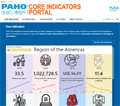
Bonaire, Sint Eustatius and Saba - Territory Profile
The Health in the Americas+ country profiles are based on the interagency indicators available as of the dates referenced. The sources are referenced in this table. In some cases, the values of the indicators may differ from the most recent data available in the country.
Environmental and social determinants of health
In 2000 the total population of Bonaire, Sint Eustatius and Saba was 14 233 inhabitants; by 2024 this figure had risen to 30 675, representing a 115.5% increase. Regarding the country’s demographic profile, in 2024 people over 65 years of age accounted for 14.4% of the total population, an increase of 6.8 percentage points compared to the year 2000. In 2024, there were 94.3 women per 100 men and 91.2 older people (65 years or older) per 100 children under 15 years of age, as can be seen in the country’s population pyramids, distributed by age group and sex (Figure 1). Considering the population between 15 and 64 years of age to be potentially active (i.e., potential participants in the labor force), this group represented 69.8% of the total population of the country in 2024 ( 21 419 people). When we add these figures to the potentially passive population ( 4 841 under 15 years of age and 4 417 over 65 years of age), the result is a dependency ratio of 43.2 potentially passive people per 100 potentially active people. This ratio was 50.7 in 2000.
Life expectancy at birth in 2024 was 77.6 years, higher than the average for the Region of the Americas and 1.5 years higher that in 2000 (76.1).
Figure 1. Population pyramids, years 2000 and 2024
Health situation
Maternal and child health
Between 2014 and 2018, infant mortality in Bonaire, Sint Eustatius and Saba remained stable at 0 deaths per 1000 live birth . The proportion of low-birth-weight births (<2,500 grams) decreased from 13% to 0% between 2014 and 2018.
In reference to the immunization strategy, it should be noted that immunization coverage against measles was 100% in 2012, which means that there was no variation with respect to the coverage in 2012.
In relation to fertility, it is estimated that in 2024 women had an average of 1.5 children throughout their reproductive lives. In the specific case of adolescent fertility, there was a 62.4% decrease, from 39.5 live births per 1000 women aged 15 to 19 years in 2000 to 14.9 in 2024. There was no variation in the percentage of prenatal control, which remained at 100%, also recording a percentage of coverage of deliveries attended by trained personnel of 100% for 2018.
The sources of the interagency indicators used in this profile can be found in this table.
 For the latest data on health indicators for the Region of the Americas, be sure to visit the PAHO Core Indicators portal.
For the latest data on health indicators for the Region of the Americas, be sure to visit the PAHO Core Indicators portal.
Country COVID-19 Perspective
Status of the COVID-19 Pandemic
In the islands of Bonaire, St. Sonaire and Saba in 2020, there were a total of 189 cases of COVID-19, representing 7098 per million population. In 2021, there were 3236 identified cases, equivalent to 121 524 per million population. In 2022, there were 7 881 identified cases, equivalent to 295 961 per million population. In 2020, there were 3 deaths directly caused by COVID-19 in people diagnosed with the disease, or 113 per million population; in 2021, 20 deaths were reported, or 751 per million. In 2022, 15 deaths directly caused by COVID-19 in people diagnosed with the disease, or 563 per million population. In 2020, Bonaire, St. Sonaire and Saba ranked 33th in the Region of the Americas in terms of the number of deaths from COVID-19, and 9th in 2022, with a cumulative 1427 deaths per million population over the considered years.
By December 31, 2021, 22% of the country's population had at least one dose of COVID-19 vaccine. As of April 20, 2021 (latest available data), 11% of the population had the complete schedule. The vaccination campaign started on February 20, 2021 and so far 2 types of COVID-19 vaccines have been used in the country.
Prospects
The islands of Bonaire, St. Sonaire and Saba are located in the Caribbean and have been special municipalities of the Netherlands since 2010. This change in administration has resulted in greater benefits related to social determinants and health, a universal health insurance system and improved medical care and education.
With respect to the COVID-19 pandemic, the country received technical cooperation from the PAHO office in the development of guidelines, protocols and the preparation of the health system.
The pandemic imposed significant challenges on the region. In addition to restrictions on mobility and tourism, the country faced a shortage of human resources and the need to redeploy health professionals from ministries and health departments to health care tasks. CITATION PAH21 30822 (2) The vaccination strategy is expected to continue, optimizing the coverage of complete vaccination schedules and reinforcing access to booster doses.
COUNTRY/TERRITORY PROFILES
Anguilla
Antigua and Barbuda
Argentina
Aruba
Bahamas
Barbados
Belize
Bermuda
Bolivia
Bonaire, Sint Eustatius, and Saba
Brazil (English) (Português)
Canada
Cayman Islands
Chile
Colombia
Costa Rica
Cuba
Curaçao
Dominica
Dominican Republic
Ecuador
El Salvador
French Guiana, Guadeloupe and Martinique
Grenada
Guatemala
Guyana
Haiti (English) (Français)
Honduras
Jamaica
Mexico
Montserrat
Nicaragua
Panama
Paraguay
Peru
Puerto Rico
Saint Kitts and Nevis
Saint Lucia
Saint Vincent and the Grenadines
Sint Maarten
Suriname
Trinidad and Tobago
Turks and Caicos Islands
United States of America
Uruguay
Venezuela
Virgin Islands (British)
Virgin Islands (U.S.)


